What does it take to succeed? Philadelphia program teaches kids ‘grit’
-

A 'street sweeper" shotgun with cartridge capable of hold 12 rounds of ammunition (foreground) and an antique Uzi (in case) are among the weapons collected at the Trenton buyback program. (Phil Gregory for NewsWorks)
-

A shoulder-firing rocket launcher is among the weapons turned in at the Trenton gun buyback program (Phil Gregory for NewsWorks)
-

More than 2600 guns collected at buyback program in Trenton. (Phil Gregory for NewsWorks)
-
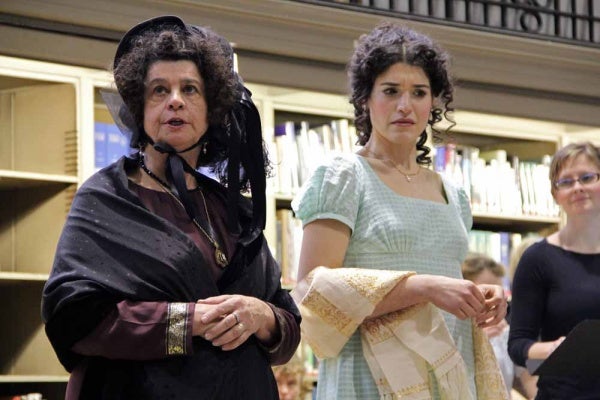
<p>Elizabeth (Julia Wise) reacts to the remarks of the imperious Lady Catherine DeBourgh (Helga Krauss). (Emma Lee/for NewsWorks)</p>
-
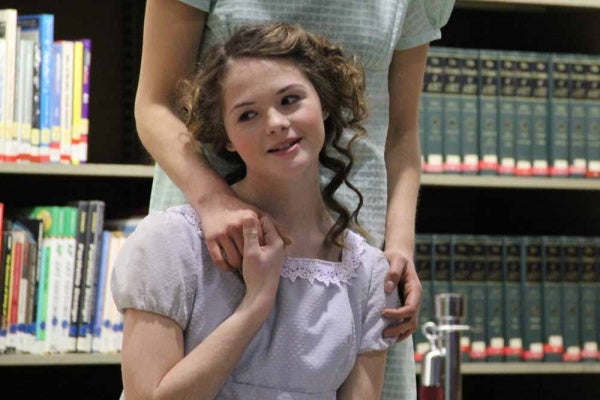
<p>Kitty (Jessica Hobbs-Pifer) dreams of wedded bliss during the Old Academy Players performance of "Pride and Prejudice" at the Free Public Library. (Emma Lee/for NewsWorks)</p>
-

<p>Mrs. Bennet, portrayed by Jane Jennings performs a scene from "Pride and Prejudice" at the Free Public Library. (Emma Lee/for NewsWorks)</p>
-
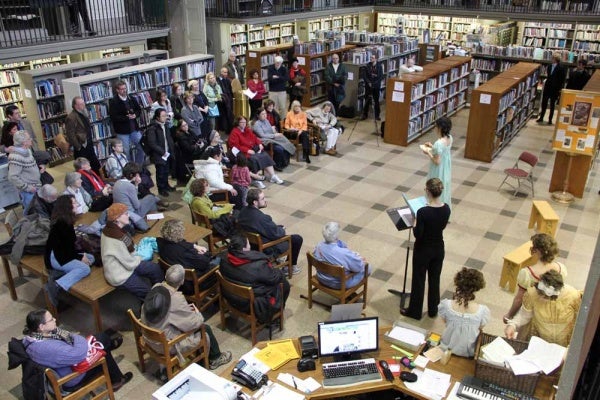
<p>The Old Academy Players perform the last of the pop-up scenes from "Pride and Prejudice" in Pepper Hall at the Free Public Library. (Emma Lee/for NewsWorks)</p>
-
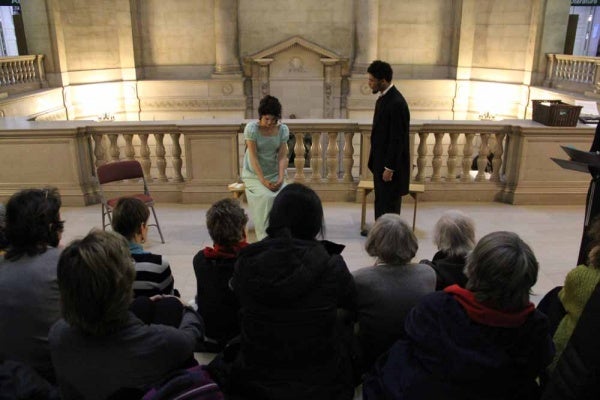
<p>Julia Wise and Isaiah Price perform a stormy scene from "Pride and Prejudice" between Elizabeth and Mr. Darcy. (Emma Lee/for NewsWorks)</p>
-
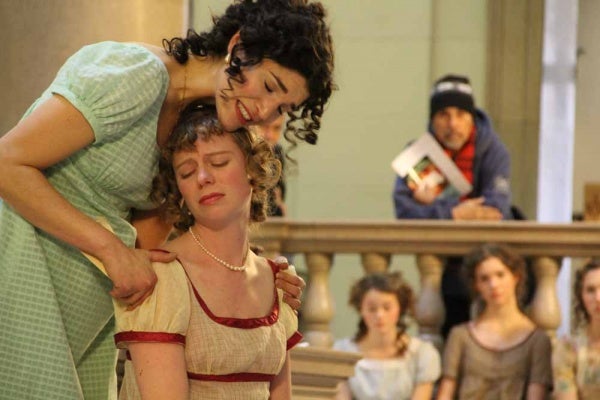
<p>Members of the Old Academy Players of East Falls perform scenes from Pride and Prejudice. Here Elizabeth (Julia Wise) comforts her sister Jane (Laura J. Seeley) after the arrival of a letter bearing bad tidings. (Emma Lee/for NewsWorks)</p>
-
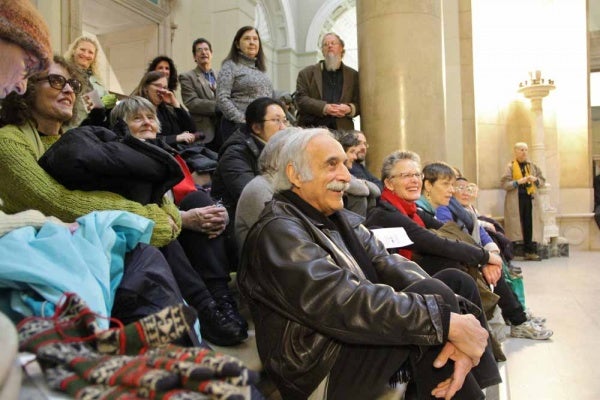
<p>Audience members find seats on the steps in front of the Social Science and History department of the Free Public Library to watch a performace of scenes from "Pride and Prejudice." (Emma Lee/for NewsWorks)</p>
-

<p>Mr. and Mrs. Bennet (Nick Lutwyche and Jane Jennings) argue over their daughter's refusal of a marriage proposal. (Emma Lee/for NewsWorks)</p>
-
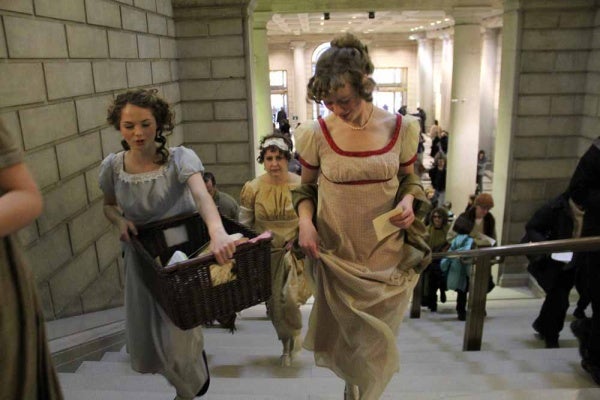
<p>Old Academy Players carry their props from location to location during a series of pop-up performances of scenes from "Pride and Prejudice." (Emma Lee/for NewsWorks)</p>
-

<p>Jane (Laura Seeley) and Elizabeth (Julia Wise) react to the unwanted attention of Mr. Collins (Brian Weiser) during a pop-up performace at the Free Public Library. (Emma Lee/for NewsWorks)</p>
-
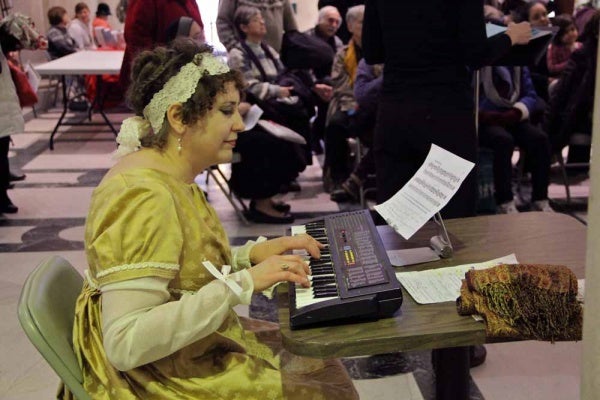
<p>Jane Jennings, who portrays Mrs. Bennet in the Old Academy Players' performance of "Pride and Prejudice," doubles as a musician for the dance scene. (Emma Lee/for NewsWorks)</p>
-

<p>The Old Academy Players of East Falls stage a dance scene in the lobby of the central branch of the Philadelphia Library to celebrate the 200th anniversary of the publication of "Pride and Prejudice." (Emma Lee/for NewsWorks)</p>
-
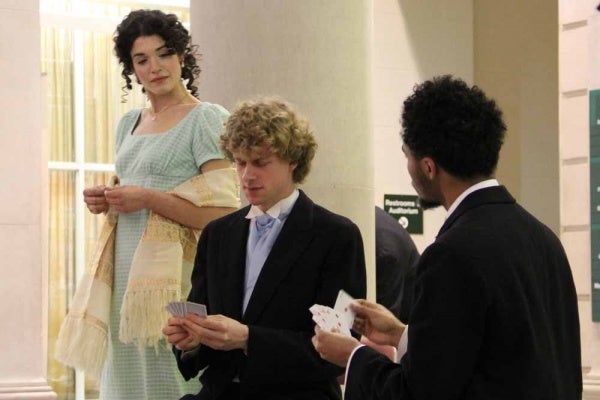
<p>Elizabeth Bennet, portrayed by Julia Wise, interrupts a card game between Mr. Bingley (Frederick Brown) and Mr. Darcy (Isaiah Price). (Emma Lee/for NewsWorks)</p>
-

<p>The Bennet sisters: Mary, Kitty, and Lydia, (portrayed by (from left) Grace Kauffman-Rosengarten, Jessica Hobbs-Pifer, and Marion Standefer, comment on Mr. Darcy's atrocious behavior. (Emma Lee/for NewsWorks)</p>
-
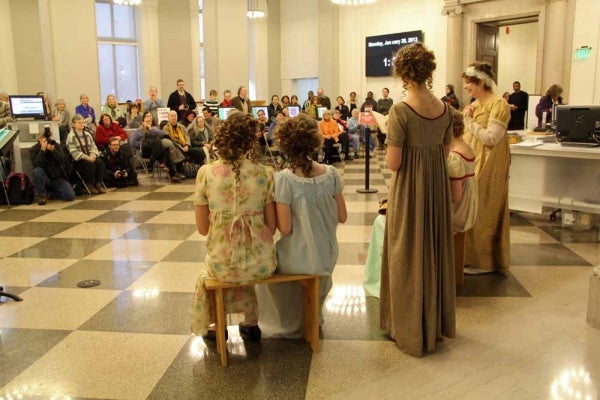
<p>The Old Academy Players from East Falls put on a pop-up performance of scenes from "Pride and Prejudice" in Philbrick Hall to celebrate the 200th anniversary of the publication. (Emma Lee/for NewsWorks)</p>
-
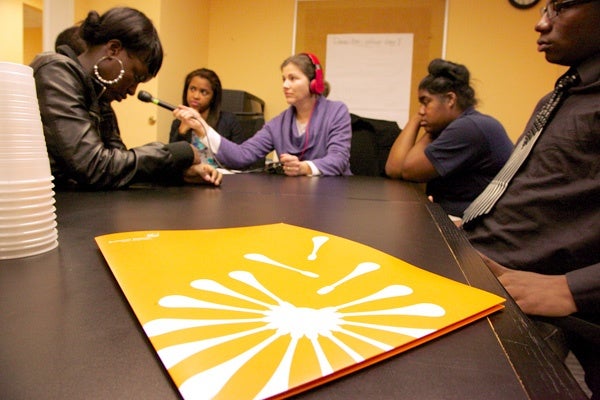
<p>Maiken Scott interviews students who work with Summer Search in Philadelphia. (Nathaniel Hamilton/for NewsWorks)</p>
-
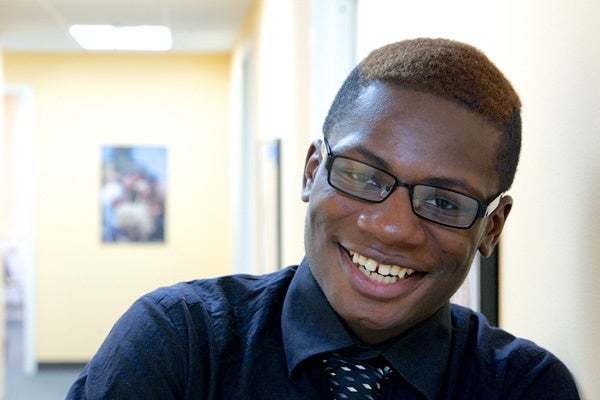
<p>Summer Search student Joseph English is 18 and is attending Abraham Lincoln High School. (Nathaniel Hamilton/for NewsWorks)</p>
-
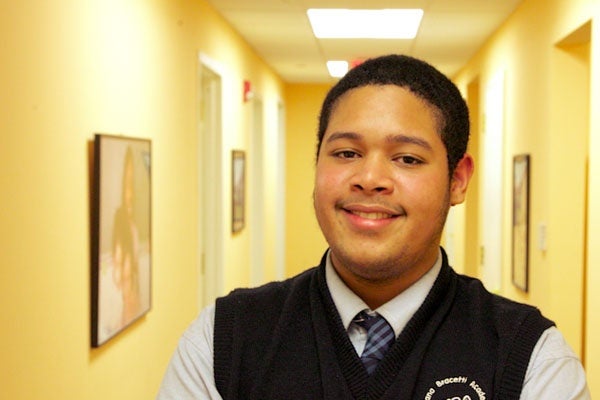
<p>Summer Search student Felix Llanos is 17 and is attending Mariana Bracetti Academy Charter School. (Nathaniel Hamilton/for NewsWorks)</p>
-

<p>Summer Search student Tiara Willis, 21, is attending Community College of Philadelphia. She is shown standing in front of her photo with Philadelphia Mayor Michael Nutter. (Nathaniel Hamilton/for NewsWorks)</p>
-
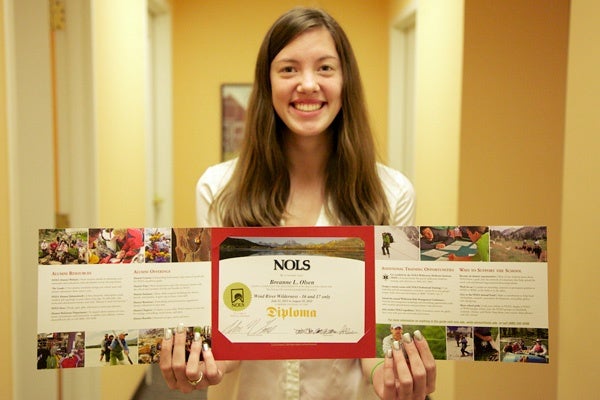
<p>Breanne Olsen, a Summer Search student from Philadelphia, received her National Outdoor Leadership School certificate in the mail. (Nathaniel Hamilton/for NewsWorks)</p>
What helps children succeed? The question has long puzzled parents and educators alike. IQ and test scores have garnered a lot of attention, but a new school of thought introduces a different concept: grit. In other words, dedication, the ability to stick things out, to cope with setbacks.
A Philadelphia program aims to instill these qualities in young people — through regular mentoring and adventurous trips.
It’s not a program to rescue the worst troublemakers. It’s not a program to engage standout, superstar kids. Summer Search is for kids who are somewhere in the middle, failing quietly.
Felix Llanos of North Philadelphia is one of the kids participating in Summer Search. “I was one of the people who, you can say, I was angry at the world,” he recalls about the time before he started the program.
Joseph English, 18, used to get in trouble in school. Teachers considered him a bully and a loud mouth. “I was just a kid who just wanted somebody to speak to,” he says. “I was just a kid who just wanted a father.”
Kamira Sloan of West Philadelphia says people didn’t normally ask her about her everyday life or want to know about her. She was fighting all the time at home, and not doing well in school.
But some one, usually a teacher, sees something in these kids — character traits that should enable them to thrive and succeed, with some support and help.
“We’re looking for kids who can take ownership, kids that have follow-through, have some adaptive skills, and can do problem solving,” explains Amanda Jefferson who directs Summer Search.
Building up traits for success
The program pairs low-income kids with mentors in a five-year quest to strengthen specific traits — curiosity, self-reflection, altruism, empathy, appreciation and performance — to help them succeed.
Kids start the program in their sophomore year of high school, and the ones who stick with it get support through their second year of college. They meet weekly with a mentor in the organization’s Center City offices, to build up their skills. Come summer, they go on their first adventure, usually a wilderness experience, says Jefferson.
“They are going to go completely out of their comfort zone, and hike and canoe and track, get on the plane for the first time,” she says. “It’s all about pushing them out of their comfort zone and teaching them all about the team building, and the grit and the resilience that all comes along with that.”
Sloan said when she went on her first trip, she did not think that she would be able to live in the woods for two weeks.
“But I did it, and I didn’t cry all the time, so I give myself credit for that,” she says. “And I found a whole bunch of confidence.”
Setbacks can build up grit
Getting through rough spots is a big part of building up grit, says education writer Paul Tough who summarizes what we know about grit in his book “How Children Succeed.”
“A lot of is developed through experience, especially through experiencing setbacks and failure, and learning how to overcome them,” he says.
Summer search invests about $25,000 per kid, for mentoring and trips, covering everything from passports to hiking boots. The program is funded through grants and donations.
Participants English, Llanos and Tiara Willis say becoming more resilient, and developing grit, also meant shedding low expectations for themselves.
English says he was used to seeing drug dealers on the corner, or young girls pregnant.
“It didn’t faze me any more, because it was like an everyday schedule, the same homeless people, the same drug dealers,” explained the Lincoln High School senior, who now dreams of a career as a fashion designer.
Willis is now a student at Philadelphia Community College, but it was a long journey to get there. “My grandparents were on drugs, so that was what I was used to, and my mom wasn’t around,” she says. “So I thought that was normal, so, the idea of fatalism, thinking, that’s all you’re able to do, with nobody around to encourage you.”
Llanos agrees and says he didn’t have any role models in his family. “A lot of them are dropouts, not many of them resort to high things, so, a lot of people would judge me, and say, ‘You’re going to end up like them’, so I started to think, why should I try harder, to be different from them?”
A question of control
Jefferson says kids have to learn that the only thing they can really control is themselves — and their behavior. “Holding up the mirror, what are you doing, to sabotage your own life?” she says.
Sometimes it seems like small stuff says Oumou Jallah, 17. “When I got into situations with classmates, my response was very rude, and very negative,” she says. But her classroom behavior was causing big problems for her in school, until she committed to changing her response.
It’s often a rocky path says Jefferson; about 15 percent of students drop out of the five-year program.
Sloan recalls doubting the program along the way.
“Sometimes I felt like, this is not going to work, so why do I need to do this?” she says. “But it did, and I’m glad that it did, because the outcome is great.”
Grit and character development are hot concepts in psychology and education right now — and Philadelphia is a hub for this research. Amanda Jefferson says it’s great to see how the academic work is validating the approach used by Summer Search.
Sloan, English, Llanos, Jallah and Willis are all college bound. They’re excited for their future and say summer search is where they found their new, optimistic selves.
WHYY is your source for fact-based, in-depth journalism and information. As a nonprofit organization, we rely on financial support from readers like you. Please give today.

